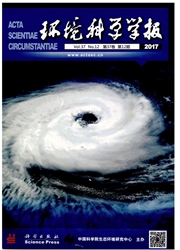

 中文摘要:
中文摘要:
从浙江某制药企业污水处理池的活性污泥中筛选到一株高效降解正己烷的菌株NX-1,经形态观察、生理生化试验和16S r DNA序列分析确定其为Pseudomonas mendocina.由于正己烷的去除速率与细胞表面疏水性(CSH)密切相关,故研究了影响P.mendocina NX-1CSH的关键因素.利用微生物黏着碳氢化合物法测定不同环境条件下的CSH,发现p H、淀粉和壳聚糖浓度显著影响CSH值;通过Box-Behnken设计及响应面分析确定了提高P.mendocina NX-1 CSH的最优条件:p H为7.61,淀粉浓度为9.39 g·L-1,壳聚糖浓度为1 g·L-1,最大CSH达到56.0%.
 英文摘要:
英文摘要:
An efficient hexane-degrading strain named NX-1 was isolated from the activated sludge which was collected from the sewage treatment tank in a local pharmaceutical plant in Zhejiang Province. The strain NX-1 was identified as Pseudomonas mendocina through the morphological and physiological identification and 16 S r DNA sequence analysis. Since hexane removal rate was closely related to cell surface hydrophobicity( CSH),this study subsequently investigated the key factors influencing the CSH of P. mendocina NX-1. The method of the microbial adherence to hydrocarbon was employed to determine the value of CSH. It was found that CSH was significantly affected by p H,starch concentration and chitosan concentration. The Box-Behnken design and response surface methodology were conducted,and the optimal conditions were found to be p H 7. 61,starch concentration 9. 39 g·L-1and chitosan concentration 1 g·L-1,resulting in the CSH as high as 56.0%.
 同期刊论文项目
同期刊论文项目
 同项目期刊论文
同项目期刊论文
 期刊信息
期刊信息
